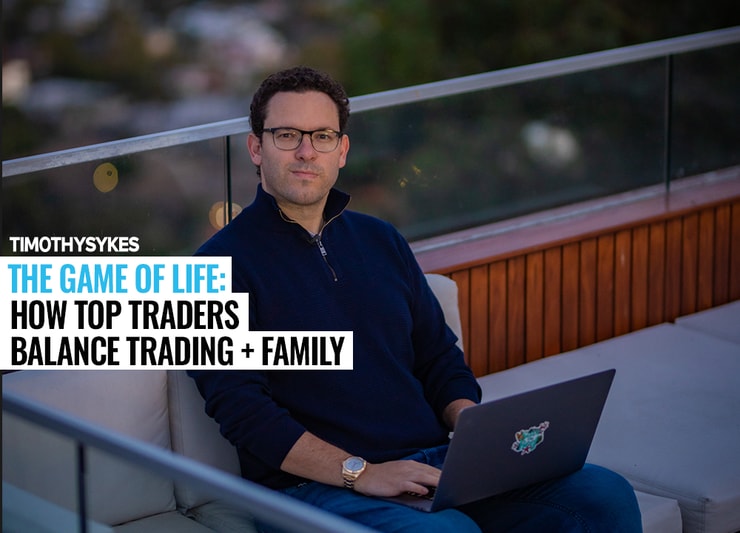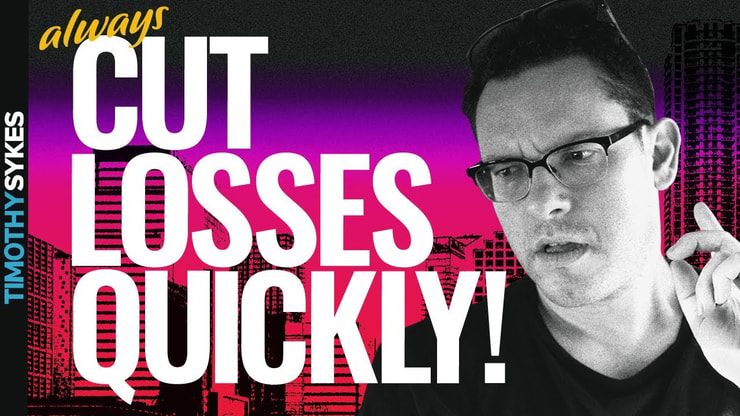Trading vs. family. Do you have to pick just one?
No way! Plenty of people manage both on a daily basis. How do they make it work?
It’s all about flexibility. When I talk about adapting, I’m not just talking about changing up your trading strategies or the sectors you trade.
Traders need to go with the flow when life events happen, too.
It’s a topic that’s been on my mind since my millionaire student turned options trader Mark Croock just welcomed his third baby. Mazel tov!
Mark started trading before he had any children — he’s had to adapt to accommodate his growing family.
It’s not always easy to balance trading and family. But as the students featured in this post prove, it’s possible — it’s all about getting your priorities straight and making time for what matters.
Table of Contents
Is It Possible to Be a Trader and Have a Family?
Yes. Many of my Trading Challenge students have families — traditional, non-traditional, and everywhere in between.
I just mentioned Mark Croock … He’s managed to develop an education program for options trading while helping to support his family. I’m incredibly proud of what he’s achieved as a trader and excited about his new addition…
Sorry no @thehonestcroock webinar today for https://t.co/occ8wKmlgm students as he just had a new baby today, please retweet this and congratulate him on this beautiful new addition to his family! We love you Mark, congratulations on this incredible new blessing, mazel, mazel! pic.twitter.com/0NWAMQOlFp
— Timothy Sykes (@timothysykes) May 6, 2021
Several other top students have families, too.
For instance, my top student Tim Grittani, who’s over $13.5 million in profits as of late May 2021, has two children.
Michael Goode, my first millionaire student and former hater, has a wife and a child.
My millionaire student Roland Wolf, who passed the million-dollar mark in 2020, has three children with his high school sweetheart.
Does having a family hold them back from reaching their full potential as traders?
Not at all. If anything, I think it inspires them to work harder and trade smarter.
Here’s why having a family can actually be good for traders…
How Family and Community Helps Traders
Keep in mind, what classifies as “family” will be different for everyone. For example, family doesn’t just mean relatives to me. It means my trading community, too…
Whether your family is traditional or non-traditional, here are some of the benefits that a close-knit community has to offer…
A Source of Motivation
For many of my students, family provides a powerful and ongoing source of motivation.
Possibly even more motivating than my daily study checks…
9:47pm study check, retweet/favorite this if you're up studying or making your watchlist for tomorrow. Also, retweet if you promise to practice disciplined/SAFE trading tomorrow, no gunslinging/gambling BS like too many newbies are tempted to do — that NEVER ends well over time!
— Timothy Sykes (@timothysykes) May 17, 2021
For instance, Roland started trading with $4,000 because he hated his day job and wanted to give his kids a better life.
Here’s another example. My student Brock, who’s up over $945,000 in trading profits as of mid-May, trades so he can improve his kids’ lives.
Talk about a long-term grind. He spent years studying and trading without much to show in terms of profits … But when things started to click, he went parabolic. Just look at his profit chart…
Family is motivating for up-and-coming traders, too. For instance, my student Chris already had a job he loved. But he wanted to give his kids more security.
After trying trading on his own and experiencing a series of losses, he applied for my Trading Challenge. He officially started on February 12, 2021. As of March, he’d profited “enough to cover the cost of the Challenge and then some.”
A Reason to Stay Safe
My #1 rule, now and forever, is to cut losses quickly.
For many students with families, managing losses is extremely important. After all, if they lose it could affect their loved ones.
It’s a simple fact: trading decisions have more gravity when other people are depending on you.
For many traders, that’s a compelling reason to avoid doing stupid things.
Every trader has losses — even me. You can’t control whether you win or lose. But you can control the size of your losses…
More Breaking News
- Will Northern Dynasty Minerals Rise Higher?
- Why Critical Metals is Buzzing
- Ford Extends Discounts to Boost Model Sales
Freedom to Spend Time With Family
For me, trading isn’t just about money. It’s about giving back and freedom.
Trading allows me to live the kind of life I want. I get to travel and trade from wherever I go.
For many of my students, trading has provided a solution that gives them greater freedom and time to spend with family and friends.
For instance, consider my student Sandra. I featured her in my female Trading Challenge student roundup. She’s currently up over $28,000 in trading profits as of mid-May.
Sandra worked a demanding job that kept her from spending the time she wanted with her daughter. It also prevented her from visiting family in Germany.
She wanted a job that would give her a more flexible lifestyle and schedule.
Sandra says, “Trading has proved to check all boxes! I actively trade during the morning and back again at power hour. During the day, I keep an eye on markets and the chat room. I’m at home when my daughter finishes school and don’t spend hours commuting back and forth to an office.”
She was also recently able to spend a few months in Germany. Not only did she get quality time with her parents, but she was able to trade as usual even though she was abroad.
A Way to Give Back
When I first started finding success as a trader, one of the first things I did was buy my parents their dream home. I love that I was able to do that.
More recently, I dedicated a school to my mom:
Happy Mother’s Day to my mom, the best mom in the world and it’s my honor to surprise her with a school in her name, The Jo-Ann Sykes School! Even though I can’t be with her in person on this special day, I’m proud to announce the 81st @karmagawa school in her honor as she ROCKS! pic.twitter.com/H7UqL3DEvV
— Timothy Sykes (@timothysykes) May 9, 2021
My family means a lot to me … Without their blessing, I never would have started trading with my $12,415 in bar mitzvah money. I might not have become a millionaire trader or teacher.
My life could have turned out a lot differently…
For many students, trading provides the means to give back to their families and community.
For instance, my student Jack Kellogg, who is over $6.7 million in trading profits as of mid-May, recently made an extremely generous gesture on his birthday. He gave his parents $50,000 each!
He recognized the sacrifices his parents made to support him as he was growing up … It was his way to show his appreciation. Don’t miss the full story!
Another story I’ll never forget? When my student Paul bought his mom a house in cash using his trading profits. He wanted to thank her for always being there for him…
Here's video of my https://t.co/EcfUM6l2S3 student Paul surprising his mom with a new house after a record 2020…how cool is this?! I TRULY LOVE SEEING THIS AS WE SHOULD ALL TREAT OUR PARENTS WITH GIFTS LIKE THIS AFTER WE WORK OUR BUTTS OFF FOR YEARS IN ORDER TO ACHIEVE SUCCESS! pic.twitter.com/j6RjwB1dyd
— Timothy Sykes (@timothysykes) January 10, 2021
Talk about three very good sons!
Balancing Family and Trading
How do traders actually balance family and trading? There are only so many hours in the day…
Once again, it’s all about adapting and figuring out what works for you.
Consider my student Tessa, who was also featured in my female Trading Challenge student roundup. She’s one of the most dedicated students I have. She’s also a single mom with a very young child.
For Tessa, it’s about making the most of her son’s natural rhythms — and technology.
She says, “My son’s sleeping schedule allows me to participate during the hottest parts of the market; both the first and last hours of the trading day. On busier days, the mobile charts are my friends. With my son being young, trading allows me to spend all my time WITH him which also allows me to influence his financial education that he won’t learn in school.”
Sandra, who I talked about earlier, has adapted her strategy to fit her schedule. She still works part-time and is working toward an online degree, so time is at a premium.
However, these time constraints also force her to focus. Sandra only has time to focus on key setups that work for her versus trading random patterns that usually result in losses.
She learns on the go, listening to webinars while she walks the dog or drives. As she says,
“I also bought some high-quality headphones and currently listen to “Penny Stock Framework Part Deux” when I work around the house so that I can focus better.”
It’s a Family Affair…

2025 Millionaire Media, LLCThere are many different ways to approach trading.
If you ask me, that’s one of the best things about getting into the penny stock game. It’s not a 9-to-5 job, and there’s more than one way to approach the market.
This makes trading accessible to a variety of different people. No matter what your schedule, your family situation, or your preferred trading style, there’s a way to make it work for you.
Of course, it’s going to require hard work no matter what. You’ll have to put in the study time and dedicate yourself to the process.
Are you motivated and ready to put in the time? Consider applying for my Trading Challenge.
How do you balance family and trading? Leave a comment … I love hearing what you have to say!












Leave a reply